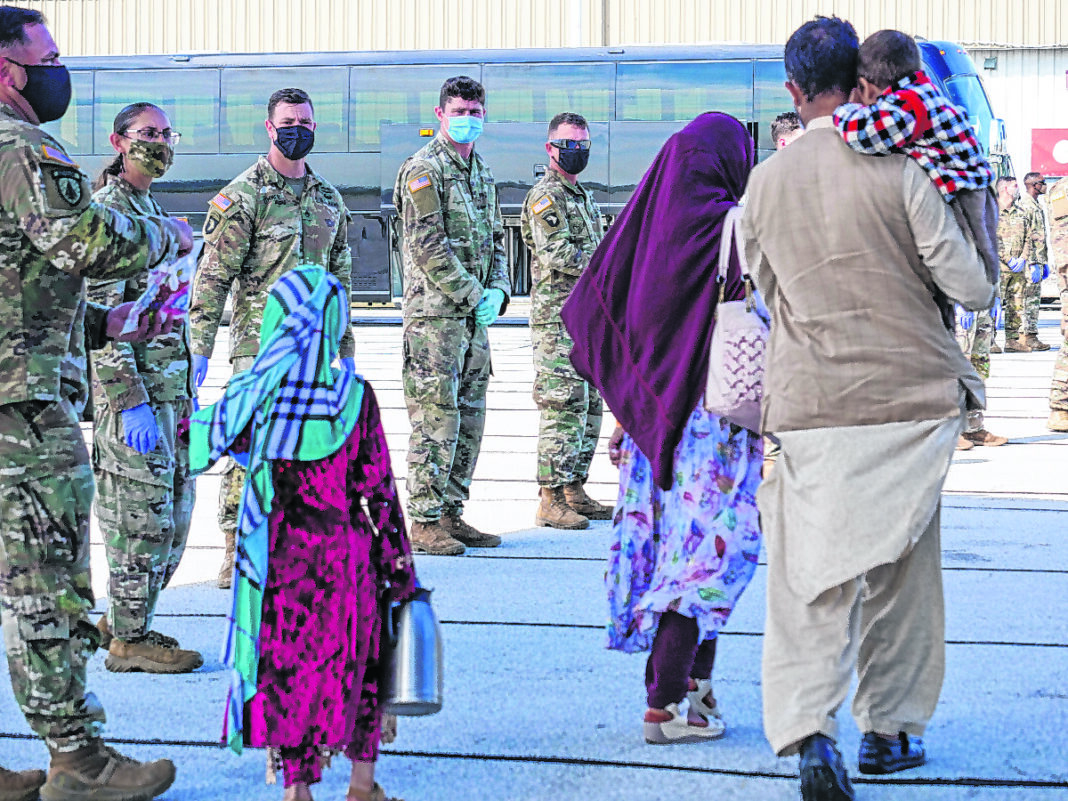The first Afghan refugees arrived late Thursday in southern Johnson County as part of Operation Allies Welcome.
The refugees arrived in Indiana via aircraft and were bussed to the National Guard base near Edinburgh.
The exact number of refugees at the base will not be made available.
“Afghan evacuees will continue to arrive in the Hoosier state, but due to operational security concerns, we will not publish flight arrival times nor exact evacuee numbers. The number of Afghans housed by Task Force Atterbury flexes as more arrive, and as they depart once their quarantine and processes conclude, yet Camp Atterbury will be able to accommodate up to 5,000,” said Master Sgt. Jeff Lowry, spokesperson for the Indiana National Guard.
A Camp Atterbury news release said about 2,500 Afghans could be temporarily housed at the base immediately.
Earlier this week, Brig. Gen. Dale Lyles said up to 5,000 could be housed at the Indiana National Guard base, with refugees to arrive in waves of about 1,000.
The U.S. Department of Defense is providing transportation, temporary housing, medical screening and logistics support for the Afghans’ safe relocation to the United States.
In addition to the regular staff stationed at Camp Atterbury, about 800 military police and health care professionals were called to serve at Atterbury from Fort Hood and Fort Knox to avoid strain on local police and hospitals.
“The professionalism of Task Force Atterbury, as they prepared to receive Afghan evacuees, is nothing short of impressive,” Brig. Gen. Niave Knell, Task Force Atterbury Commander, said in a statement. “The multi-agency, multi-component effort ensured we were ready to welcome them with open arms, providing dignity and respect to all.”
The refugees were vetted twice by multiple federal agencies before arriving at Camp Atterbury. Now at the base, they are being vetted again by the Department of Homeland Security, Customs and Border Patrol, FBI and Department of State, Lyles said Tuesday.
With so much vetting, there is little to no risk to surrounding communities, he said.
Refugees are also being checked out medically by a team of military health care professionals brought in for the mission. They will be offered a COVID-19 vaccine and will be given other vaccines that are required to obtain a visa to live in the United States, Lyles said.
Local police will do routine patrols in the area, but won’t need to do anything beyond that, Sheriff Duane Burgess said. The Johnson County Sheriff’s Office, Edinburgh Police Department and other nearby agencies are being briefed on safety measures at the base.
Similarly, local hospitals are not being tapped to help care for the refugees, as extra medical equipment and staff have been brought to base to treat and diagnose a variety of conditions they may have, Lyles said.
Any refugees who test positive for COVID-19 will be placed in an isolation area and receive any treatment that is needed on base, he said.
The refugees will be at Camp Atterbury for at least 14 days before being allowed to leave. When they are cleared to leave, most are likely to settle in other parts of the country, though some may stay in Indiana.
Some could be at the base for up to nine weeks, but may leave as quickly as the 14-day medical waiting period. That will depend on how long it takes to find permanent housing, Lyles said.
Team Rubicon has been selected to coordinate donations for Afghan refugees.
The nonprofit disaster response organization has many veteran volunteers who worked closely with Afghans during the war, according to a fact sheet on their resettlement campaign.
The team is accepting donations and volunteers to work with refugees at all of the sites where the DOD is housing them.
Camp Atterbury is one of eight sites across the United States. DOD, through U.S. Northern Command, will support up to 50,000 Afghan refugees at those sites.





